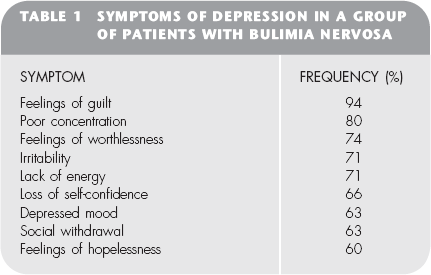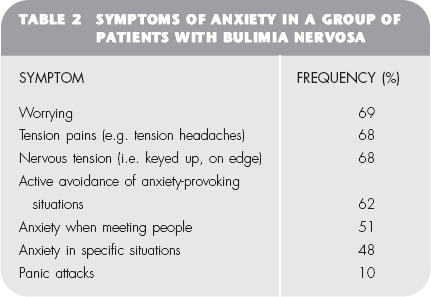
My life revolves around my eating. I can no longer concentrate on my work which has suffered greatly as a result. My problem has caused family rows. I no longer enjoy sharing meals with family or friends. I have become withdrawn and introspective and have lost all self-confidence and self-respect. I don’t want to go out. I don’t like myself any more.
Bulimia nervosa and binge-eating have a profound effect on people’s psychological well being and their social life. Symptoms of depression and anxiety are common and social life can suffer greatly.
As noted in the previous section, the self-esteem of people who binge is intimately bound up with how they see their body shape and weight. So, if they regard their weight or shape as unacceptable, they feel themselves to be worthless. Therefore, it is particularly humiliating for them periodically to lose control of their eating and overeat. They feel intensely ashamed of themselves and disgusted at themselves for being unable to maintain control over their eating. At times they feel utterly desolate and hopeless about their eating ever improving.
Not surprisingly, patients who binge who come for treatment typically display a number of symptoms of depression. Table 1 shows how often such symptoms occurred in one group of patients with bulimia nervosa. The figures in the table are based on patients’ responses to a standardized psychiatric interview designed to detect the presence of symptoms of sufficient severity to have a marked negative effect on functioning.
It can be seen from the table that by far the majority of people with bulimia nervosa experience a wide range of depressive symptoms. Most of these symptoms relate directly to the core disturbances in eating and the patients’ concerns about their shape and weight. So, the guilt which so many experience is usually rooted in shame about binge-eating and vomiting; the worthlessness stems from feelings of failure surrounding their control over their eating and their inability to achieve a weight and shape they regard as acceptable; and the loss of confidence and withdrawal from social contact result from feeling unable to eat in company and from regarding their shape and weight as socially unacceptable.
Many people who binge feel quite desperate at times. They hate what they are doing, they despise themselves, and they can see little, if any, prospect of their situation improving. In these circumstances, some attempt suicide, usually by taking an overdose of pills. Around 5 per cent of people with bulimia nervosa coming for treatment in Britain have at some time taken an overdose.
For the great majority of people who binge, when they regain control over their eating habits, the depressive symptoms disappear. However, in a small minority there is a depressive disorder which is independent of the disturbance in eating. In these people, even if their eating disorder improves, the depressive symptoms remain severe and disabling. It is important that these people, in addition to receiving help in overcoming their problems with eating, receive specific treatment for their depression.
People who binge frequently report that they have distressing symptoms of anxiety. These include the mental symptoms of worrying and anxious foreboding, as well as physical symptoms, such as palpitations, sweating, difficulty in breathing, and churning of the stomach. Table 2 shows how often some of these symptoms occurred in a group of patients with bulimia nervosa. As in Table 1, the percentages show how many patients experienced these symptoms severely enough to have a marked effect on their lives.

As with depressive symptoms in people who binge, these anxiety symptoms are closely linked to the core disorder of eating. So their worrying tends mainly to be focused on their concerns about food, eating, shape and weight; and the situations in which they become anxious, and which they avoid are those where there is food around or where they would feel particularly fat. These anxiety symptoms only rarely require separate treatment from the eating problems. That is, if the eating disorder is brought under control, the anxiety tends to lift spontaneously.
Many people who binge, at times when they have done things they regret, such as following a binge, feel extremely angry with themselves. Some people take laxatives after a binge explicitly for their unpleasant physical effects, as a means of self-punishment. Others punish themselves even more drastically. Some will hit themselves with a belt or rope, or even knock themselves about with a stick or a hammer. Others cut themselves. Usually the cutting or scratching causes only minor skin wounds, with some bleeding. In some cases, however, the cutting is much more serious, with deep wounds being made into the muscle. People cut themselves for two reasons. First, it is a violent expression of anger and a direct form of punishment. Second, for some people, it is used to release tension, either as the urge to binge builds up or else following a binge. It is very important that people who engage in such practices receive professional help.
My eating problem has taken over my whole life. My friendships have been upset by my violent swings in mood. I never talk to my parents since they have never understood what I am going through, yet we were so close. I have so little self-confidence. I get terribly depressed and anxious. I can’t face seeing people.
The personal and social lives of people who binge suffer considerably. As already noted, binge-eating is largely a secretive practice. And the extreme measures to which people go to compensate for overeating, like vomiting and taking laxatives, are a source of much guilt and shame. This causes many people to keep their disturbed eating habits a complete secret for a number of years. This has the effect of isolating them, because a central part of their existence is kept hidden away from those with whom they live and otherwise share their lives. It is for this reason that binge-eating is a particularly lonely activity.
Concerns about shape and weight have a direct effect on social functioning. It is common for people with bulimia nervosa only to mix socially when they feel reasonably happy about their weight and shape; but the moment they binge or feel they have gained weight or become fat, they withdraw completely. Some will literally hide away, refusing to see anyone, or to allow anyone to see them, for days at a time.
Much of ordinary social life takes place around food and eating. Friends meet in bars or restaurants. They invite each other to their homes for meals. And families gather together around the table both routinely and for special occasions. All of these ordinary situations create difficulties for someone who binges; and in some, they evoke terror. The typical response is to try to avoid these situations altogether. As a consequence, they cut themselves off from ‘normal’ social life.
Bulimia nervosa and binge-eating can take a considerable toll on family life. The partner of someone with this disorder is exposed to rapid swings in mood as control over eating is maintained and then lost. Partners are frequently at the receiving end of marked irritability, and their social life is at the mercy of the course of their partner’s eating disorder. Children can suffer in much the same way. And, of course, family meals are a source of special difficulty to people who binge.
A major concern for people who binge, especially for those who are doing so often, is how to finance their eating habits. Binge-eating can be extremely expensive and leads many people into debt. Some, as already noted, much to their shame, find themselves taking food belonging to others. And some steal food and other items from shops in order to indulge their binges. This can lead to considerable friction with friends and relatives; and, of course, it sometimes leads to prosecution in the courts.
The social and personal lives of people who binge are transformed when they recover from the disorder. So much of ordinary life which had previously been closed to them is opened up by their being able to socialize freely. Intimate personal relationships become much easier and more fulfilling. And family life becomes much happier.